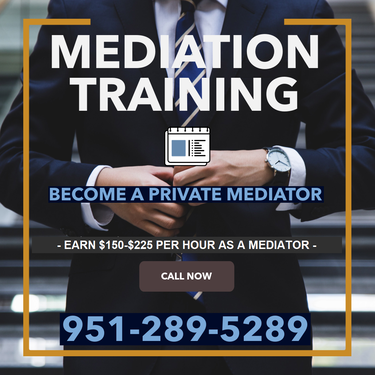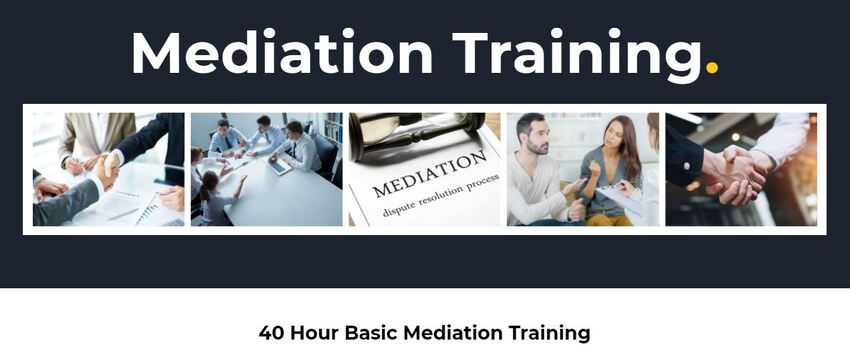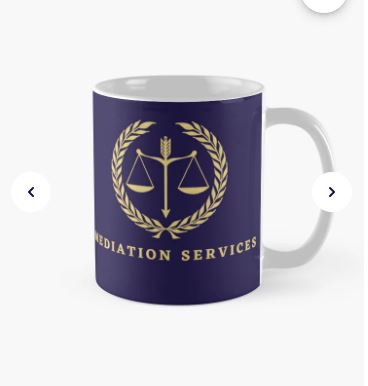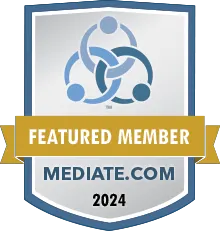40 Hour Basic Mediation Training
Need a Mediator - Click Here
Why Become a Mediator? Mediation is a career that is not affected by a downturn in the economy—it is recession proof in a forever-growing industry. Litigation continues to grow by leaps and bounds and there will always be lawsuits. One of the biggest misconceptions is that you have to be an attorney to be a mediator. This is simply not true! There are no educational requirements other than the certification training we provide, so mediation may be performed by: Real Estate Agents, Teachers, CPAs, Lawyers, Paralegals, Attorneys, Supervised Visitation Monitors, Family Counselors, Social workers, Retired Law Enforcement and Therapists.
Earn an Excellent Income Mediators in the United States earn $125.00-$250 per hour only working a few days a week. Mediation fees range from as $250- $1500 per day. The fee is based on the number of parties and length of the mediation. You will set your own hours and determine your prices in your practice. It is a go at your own pace course, and you will have 12 months to complete the course.
Earn an Excellent Income Mediators in the United States earn $125.00-$250 per hour only working a few days a week. Mediation fees range from as $250- $1500 per day. The fee is based on the number of parties and length of the mediation. You will set your own hours and determine your prices in your practice. It is a go at your own pace course, and you will have 12 months to complete the course.
40 Hour Basic Mediation Training
Please register online or call the office 951-289-5289
Please register online or call the office 951-289-5289
What you can Mediate
|
|
During a typical session, the mediator talks to the parties individually and together. They listen to what each party has to say. This gives the parties more control over the decision-making process, leading to greater satisfaction. The meeting is less formal and takes considerably less time than traditional litigation.
The Role of a Private MediatorMediators have the role to intervene between opposing parties and help them reach an agreement. They handle this process from start to finish until a resolution is reached. Their duties and responsibilities depend on the type of dispute and may include:
As a Private Mediator, you will use your communication and negotiation skills to assist clients in resolving the dispute. Everything you discuss must remain confidential. You cannot share any records, documents or reports with third parties without your clients' written agreement.
Your role as a mediator is to open dialogue and facilitate communication between disputants, helping them speak clearly about their interests. You may not impose decisions or solutions. Before taking a case, you should first research it and understand the interests and perspectives of all parties involved. You're also responsible for carrying out follow-up communication after a resolution has been reached.
The Role of a Private MediatorMediators have the role to intervene between opposing parties and help them reach an agreement. They handle this process from start to finish until a resolution is reached. Their duties and responsibilities depend on the type of dispute and may include:
- Organizing meetings with both parties.
- Obtaining their written agreement.
- Analyzing the parties’ claims.
- Trying to find a way to reach an agreement.
- Researching laws and procedures that apply in each case.
- Staying up-to-date with new laws.
- Conducting hearings to find out more about the dispute.
- Offering solutions that address all parties’ self-interests.
- Evaluating the case in a fair, unbiased manner.
- Assisting the parties to implement their agreement.
- Referring clients to attorneys and other legal authorities if necessary.
- Asking relevant questions to obtain more information.
- Helping both parties understand each other's point of view.
As a Private Mediator, you will use your communication and negotiation skills to assist clients in resolving the dispute. Everything you discuss must remain confidential. You cannot share any records, documents or reports with third parties without your clients' written agreement.
Your role as a mediator is to open dialogue and facilitate communication between disputants, helping them speak clearly about their interests. You may not impose decisions or solutions. Before taking a case, you should first research it and understand the interests and perspectives of all parties involved. You're also responsible for carrying out follow-up communication after a resolution has been reached.
You may register online or call our office and pay via phone 951-289-5289
It is a go at your own pace course and you will have 12 months to complete the course.
It is a go at your own pace course and you will have 12 months to complete the course.
Testimonial-
"What a phenomenal instructor! Darlene goes above and beyond to assure you are getting a top notch eduction and all around experience. The curriculum is thorough and comprehensive leading you into a vast world of understanding mediation. What I most admire is the encouraging spirit and the dedication Darlene brings to professionalism. So excited for my next chapter made possible by Mediation Training and Services." MM
"What a phenomenal instructor! Darlene goes above and beyond to assure you are getting a top notch eduction and all around experience. The curriculum is thorough and comprehensive leading you into a vast world of understanding mediation. What I most admire is the encouraging spirit and the dedication Darlene brings to professionalism. So excited for my next chapter made possible by Mediation Training and Services." MM
Contact Us
MEDIATION TRAINING CENTER
MedidationTrainingCenter.com
Office: 951-289-5289
818-945-9333
MEDIATION TRAINING CENTER
MedidationTrainingCenter.com
Office: 951-289-5289
818-945-9333
|
Basic Mediation Training
Introduction: The following student learning objectives establish a standard body of skills and knowledge which will provide participants an introduction to basic mediation. They provide a basis for the typical 40 hour basic mediation training and are not intended to limit or restrict additional learning objectives that trainers or Dispute Resolution Organizations find appropriate. Mastery of these skills is achieved by completing a mediation practicum program. Course Objective: Upon completion of the course the participant will demonstrate the ability to conduct a complete mediation, employing the skills, strategies, and processes outlined below. Mediation Training 1. The participants with get familiar with the intake process, screening criteria and determination of the appropriateness of the dispute for mediation. 2. The participants will be aware of the additional skills, knowledge, and training needed for effective intake. 3. When co-mediating the participant will identify and share appropriate information with their co-mediator. 4. Participants understand and can adjust the physical attributes of the mediation setting to promote effective dialog (location of parties, mediators, observers, white boards, etc.) Mediator Opening Statement 1. Participants will understand and explain mediator opening statements and agreements to mediate relevant to their Mediation Practice. 2. Participants will be aware of which issues are not protected by confidentiality and how exceptions to confidentiality should be handled in accordance with their Mediation Practice. 3. Participants will be able to explain both confidentiality and privilege and the exceptions. 4. Participants with mandatory reporting requirements understand how their obligations will be met in accord with their Mediation Practice Client Opening Statement (listening skills) 1. Participants will equitably conduct the client opening statement process in which they listen to each party’s opening statement, accurately and impartially summarize the content, relevant emotion, and underlying interests. 2. Participants will understand the fundamental role of feedback in assuring and conveying effective listening. 3. Participants will be able to analyze obstacles to communication and to apply strategies to improve parties’ ability to communicate. 4. Participants will demonstrate active listening and attending behaviors while listening to parties and taking notes. 5. Participants will appropriately summarize and reframe parties’ statements in neutral language. Exploration of Conflict (Exploration may be a separate step prior to agenda building. It will likely occur periodically as issues are clarified and negotiated.) 1. Participants will explore and analyze the issues of the conflict sufficiently to be able to summarize parties’ positions, related feelings, and underlying interests. 2. Participants will appropriately use inquiry techniques (open ended and closed questions) to ascertain greater insight into the dynamics of the conflict and reveal underlying interests. Agenda 1. Participant knows when and how to transition to agenda building. 2. Participants will assist parties in agreeing on an agenda which equitably reflects the issues of the conflict in neutral, non-positional, language. 3. Participants understand that issues related to establishing and determining the order of an agenda have strategic importance and are able to apply techniques to assist parties in determining how to proceed. Negotiation 1. Participants will assist discussion of each issue, asking questions to identify common and varying interests, and assisting parties to craft proposals addressing the interests at the table. 2. Participants will understand negotiation theory including positions, interests, settlements, bottom lines, BATNAs, WATNAs, and the role of the third party neutral in assisting in a negotiation. 3. Participants will assist parties to identify interests and utilize the interests to improve the effectiveness of the negotiations. 4. Participants will understand how power imbalance can affect negotiation and will apply strategies to assure equitable representation of all parties’ interests. 5. Participants will develop the capacity to address the dynamics of cultural constructs and patterns, gender identity, and other issues related to parties’ identities 6. Participants will understand negotiations strategies related to limited resource distribution, future behavior, values, interests, identities, communication, and relationships. 7. Participants will respect the ethical standard of self-determination, and engage the parties to ensure that negotiations are party driven. Written Agreement 1. Participants will understand and apply the essential elements of durable agreements (who?, what?, when?, where?, how?, what if?).. 2. Participants will demonstrate the ability to assist parties to develop durable written agreements characterized by clarity, balance, adherence to ethical standards and contingencies for potential difficulties. 3. Participants will assist parties to develop agreements that are perceived as sufficiently fair as to achieve voluntary compliance. 4. Participants will appropriately adjust the “level of agreement and enforceability” to reflect the needs of the parties (a spectrum from simply documenting the conversation to drafting enforceable contracts). 5. Participants will demonstrate appropriate use of reality testing in developing agreements. 6. Participants will be able to appropriately use written agreement forms. Caucus 1. Participants will understand the risks and benefits of caucuses in a mediation and appropriately determine when to use a caucus. 2. Participants will demonstrate techniques to make caucus productive such as building rapport, reality tests, role reversal, rehearsal and preparation for return to open session, coaching, identification of key issues, exploration of options, allowing for venting, developing alternatives for settlement, education regarding negotiation process, etc. 3. Participants will be able to inform parties of the process and confidentiality practices regarding caucus. 4. Participants will manage transition to and return from caucus appropriately preparing parties to resume the joint session. 5. Participants will understand and adjust interaction during caucus to assist parties while maintaining appropriate levels of impartiality. 6. Participants will assist the party not in caucus to engage in constructive activity while waiting. 7. Participants will distinguish between caucus and breaks and inform parties of how a caucus or break can be requested by either the mediation team or client. General 1. Participants will have self knowledge of their conflict styles, history, and attitudes and how their personal experience may influence their aptitude for or approach to conflict resolution. 2. Participants will be able to perceive the conflict styles of others, and will be able to adjust their mediator interventions to work effectively with all conflict styles. 3. Participants will understand that communication is comprised of both verbal and non-verbal elements and will be able to identify how either of these can escalate or de-escalate conflict. 4. Participants will be able to help parties acknowledge the impact of their statements on the other parties, and clarify their intention in making these statements. 5. Participants will understand basic conflict theory including definitions of conflict and the relationship of conflict to emotions and interests. 6. Participants will understand that there is a continuum of conflict resolution methods, including negotiation, mediation, arbitration and litigation, and will understand the advantages and disadvantages of each. 7. Participants will understand ethical issues related to mediation, particularly as it relates to confidentiality, self-determination, and voluntary participation. 8. Participants will be familiar with the American Bar Association Model Standards of Conduct for Mediators, and the Mediation Association Ethics and Standards of Practice. 9. Participants will be able to discern which issues in a conflict are negotiable and which are non-negotiable, and will have a sense of how to guide parties in discussing these issues. 10. Participants will appropriately manage the emotional climate to foster productive dialog. 11. Participants will appropriately manage anger through acknowledgement of underlying emotions. 12. Participants will be able to terminate or conclude the resolution process at an appropriate time and in an appropriate manner. |
|
Course highlights for our 40 Hour Basic Mediation Training:
|
40 Hour BASIC MEDIATION Training ONLINE $499
Mediation Documents Samples of Mediation Agreements
Certificate of Completion with Official Seal
MEDIATION Training Forms
All the Tools You Need to Succeed
40 Hour Basic Mediation Course
ONLINE
Pay via PayPal
Mediation Training Center
www.mediationtrainingcenter.com
Office Hours: 9AM-7PM Pacific Standard Time
Office: 951-289-5289
818-945-9333
www.mediationtrainingcenter.com
Office Hours: 9AM-7PM Pacific Standard Time
Office: 951-289-5289
818-945-9333
Proud Memberships
Reviews
Angela
To say Darlene is an absolutely AMAZING instructor would be an understatement. She has a 6th sense when it comes to providing quality instruction as she guides you through the training material. Her encouraging approach and practical applications took my learning to a new level of insight. Darlene is a dynamic and consummate professional. I came away from Darlene's mediation training with a wealth of knowledge and information. I feel extremely fortunate that she was my instructor.
Yolanda
The 40-Hour Basic Mediation Training course is conducted by an instructor who is knowledgeable of the subject matter. She is thorough in teaching the material with detailed information and sharing her experiences in the field. I highly recommend this training organization for either on-line or on-sight classes. You will have no regrets.
Elise -When taking Mediation classes by Darlene she was very clear and understanding explaining new concepts. Her sessions were Worthwhile and Interesting! Not only was Darlene a great teacher, but she was also a mentor!
Lorissa-I have had such a phenomenal experience throughout this entire course. I never felt like I was working through the material alone because Darlene was consistently there to give her advice , guidance, encouragement and direction. I highly recommend this course ! It was well put together, very easy to follow and extremely thorough. I truly enjoyed it.
Barbara- Instructor Darlene is gifted to communicate/teach the mediation process and train future mediators effortlessly. Not only does she teach theory but it’s the practical application, role playing and intimate interaction with each student that makes her a standout instructor and the class worth every penny.
Sandra- The course was thorough and well designed with videos, opportunities for practicum and templates and guidelines to help reinforce aspects of mediation in practice. Darlene T. was especially attentive, hosting meetings after each chapter, reviewing assignments and engaging in discussions about effective mediation implementation.
Darlene This was a wonderful course and a great value! DG New York
Darlene has created an amazing online program for anyone interested in becoming a mediator. I cannot recommend her course highly enough. Very fast to respond, pointed discussions, and an amazingly easy and accessible site. E.B
Darlene is a Great instructor. I would definitely recommend this Mediation training program. The course was very user friendly and Darlene was just a text or email away when I had any questions or needed help. She was very informative from beginning to end. Thank you Darlene. L.M.
Hello Darlene,
I really enjoyed the class. It was very informative. I look forward to taking more classes!
XC
|
Mediation Notebook on Amazon
MEDIATION NOTEBOOK, MEDIATION NOTES, MEDIATORS NOTES, MEDIATORS NOTEBOOK Great Gift for Mediators Size8.5"X11" 120 Pages Lined Paper MEDIATION GIFTS AND APPAREL MEDIATION SERVICES LOGO, MEDIATOR LOGO, MEDIATION, CONFLICT RESOLUTION, MEDIATION LOGO, MEDIATION T-SHIRT, MEDIATION STICKER, MEDIATION APRON, MEDIATION GIFTS, MEDIATION MUG, MEDIATION LAPTOP SLEEVE, MEDIATION CELL PHONE CASE, MEDIATION DRESS, MEDIATION HAT AND MORE! CLICK HERE TO VISIT STORE |
Additional Courses We Offer
Supervised Visitations Training https://www.visitationstraining.com
Advertising and Marketing
Business Strategies
17 Tips on Growing YOUR Business - Click Here
Branding Your Business
Social Media Advertising
Refresher Courses
Continuing Education Classes
One-on-One Business Mentoring
One-on-One Business Consulting
and More!
Supervised Visitations Training https://www.visitationstraining.com
Advertising and Marketing
Business Strategies
17 Tips on Growing YOUR Business - Click Here
Branding Your Business
Social Media Advertising
Refresher Courses
Continuing Education Classes
One-on-One Business Mentoring
One-on-One Business Consulting
and More!










